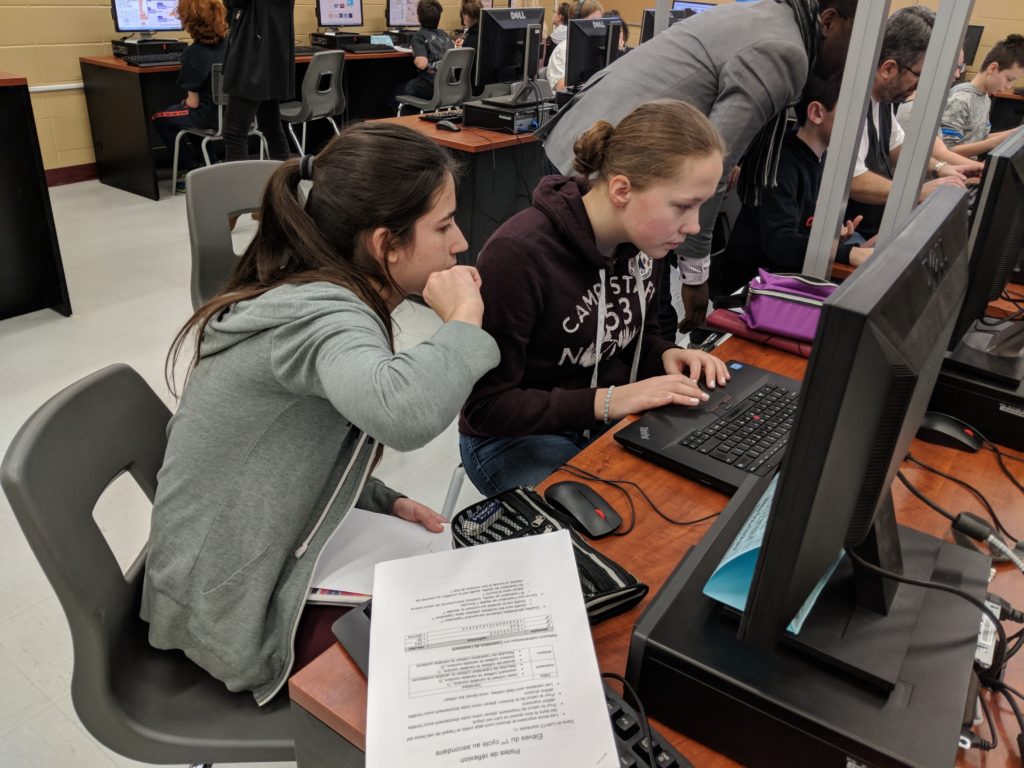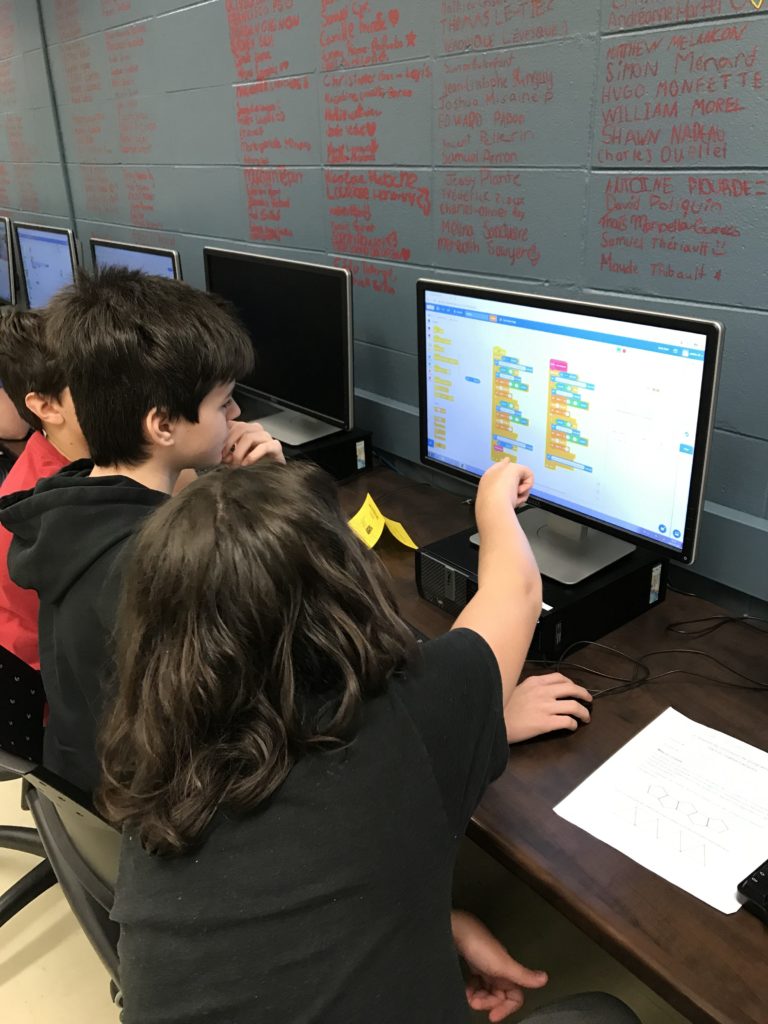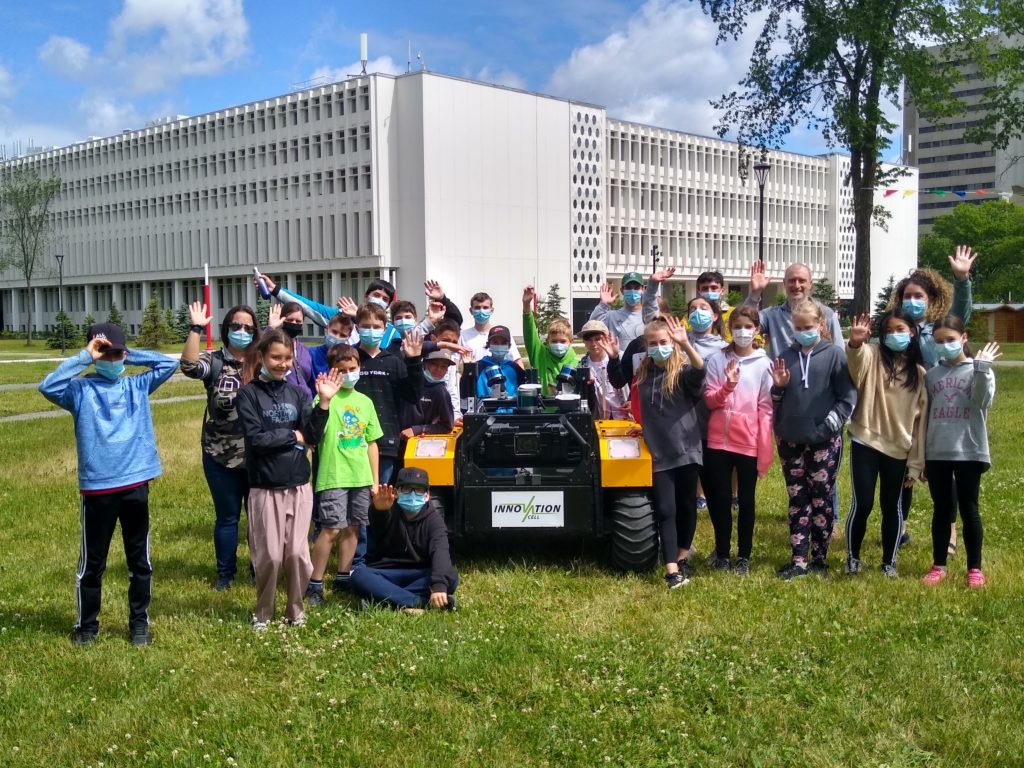Par Martin Baril, conseiller pédagogique pour la mathématique
Centre de services scolaire (CSS) de la Capitale
avec la collaboration de Sonya Fiset, conseillère pédagogique
Service national du RÉCIT, domaine de la mathématique, de la science et technologie et Martine Bélanger, conseillère pédagogique du RÉCIT, CSS de la Capitale.
Depuis 2018, les services éducatifs du Centre de services scolaire de la Capitale proposent aux enseignants un concours de programmation informatique qui cible le déploiement d’une culture du numérique dans ses établissements. Plus particulièrement, le concours se veut un levier important pour le développement de la compétence à programmer, tant chez les élèves que chez les enseignants.
Le déploiement du concours annuel se décline en quatre étapes : l’inscription, l’accompagnement, la finale et la reconnaissance. La sollicitation pour l’inscription se fait par courriels ciblés et par l’entremise d’un site Web. Ce dernier propose quelques explications, le défi à réaliser et les prix.
Pour favoriser l’adhésion, des exemples sont proposés. Les langages utilisés sont du type programmation par blocs. Découvrez le site web des éditions 2020-2021 et 2021-2022.
L’accompagnement par des conseillers pédagogiques demeure un élément incontournable pour favoriser l’adhésion et la participation des enseignants. C’est ainsi que deux ou trois rencontres sont planifiées pour présenter la plateforme de programmation et initier les participants aux concepts de base tels que la programmation séquentielle et parallèle, les structures itérative et décisive, l’utilisation des variables, le dépannage et la gestion des capteurs dans le cas de la robotique.
Les enseignants sont amenés à identifier dans leur classe les élèves experts qui ont le potentiel de devenir des ressources pour leurs pairs. Certains élèves deviennent d’ailleurs rapidement meilleurs que l’enseignant. Cela peut être déstabilisant, mais il faut se concentrer sur toute l’aide qui pourra être apportée!

Une recherche-action
Pour les éditions 2021-2022 et 2022-2023, l’accompagnement qui prépare au concours du CSS de la Capitale s’inscrit, entre autres, dans le cadre d’une recherche-action réalisée en collaboration avec l’Université du Québec à Montréal (UQAM) et dirigée par la professeure Fabienne Venant, du département de mathématiques.
Cette association permet de travailler la programmation/robotique en lien avec des concepts et des processus du Programme de formation de l’école québécoise (PFÉQ) dans le domaine de la mathématique, de la science et de la technologie. Elle élargit et enrichit l’expertise professionnelle ainsi que le soutien financier du concours par le biais du développement professionnel des enseignants, principale retombée de cette association.
En ce sens, la recherche-action favorise la mise à jour des pratiques efficaces dans l’intégration de la programmation informatique en classe et l’exploration de nouveaux modes de formation continue autour de ces pratiques.

Évolution du modèle
La finale constitue la troisième étape du déploiement. En raison de la pandémie, la réalisation de cette étape a dû être repensée pour s’assurer qu’elle est sécuritaire pour tous. C’est dans ce contexte que la 3e édition du concours de programmation (2019-2020) a été annulée en mars 2020. À ce moment, le respect des bulles-classes ne permettait pas les rassemblements comme pour les éditions 2017-2018 et 2018-2019. Pour cette année, nous avons revu l’organisation de la finale, et elle peut maintenant se tenir, en respectant la réalité pandémique et en assurant la sécurité des participants.
Dans cette perspective, le défi du concours amical ne nécessite pas d’infrastructure importante, il se mesure en temps et se déroule entièrement à l’école des participants. Pour déterminer le meilleur temps, chaque enseignant doit planifier, avec l’organisation du concours, le moment (date et heure) où les élèves participants s’exécutent.
L’enseignant joue le rôle d’arbitre en filmant les participants tout en s’assurant que la date et l’heure du moment sont illustrées et que le temps d’exécution est mesuré avec rigueur. L’enseignant fait ensuite parvenir à l’organisation la séquence vidéo du meilleur temps pour que le gagnant soit proclamé parmi tous les participants. Cet ajustement a permis également d’ouvrir le concours amical à des classes extérieures au CSS de la Capitale.
La reconnaissance constitue la quatrième et dernière étape du concours. La classe du ou des gagnants a droit à une visite au laboratoire de recherche NorLAB, spécialisé en robotique,à l’Université Laval. Durant cette visite, les élèves assistent à des démonstrations, et certains privilèges de manipulation sont accordés aux gagnants. Des prix de participation sont également offerts aux finalistes et aux enseignants qui participent avec leurs élèves.

Depuis la 1re édition, plus de 150 élèves ont participé au concours. Au-delà de 40 enseignants s’y sont impliqués, plusieurs d’entre eux ont renouvelé l’expérience. Pour le CSS de la Capitale, il est permis de croire que l’événement constitue un excellent levier pour développer la compétence à programmer. C’est dans cette perspective que l’organisation envisage un avenir prometteur.





 Recevez l'Info #DevProf et l'Hebdo pour ne rien manquer des nouveautés de l'École branchée!
Recevez l'Info #DevProf et l'Hebdo pour ne rien manquer des nouveautés de l'École branchée!




